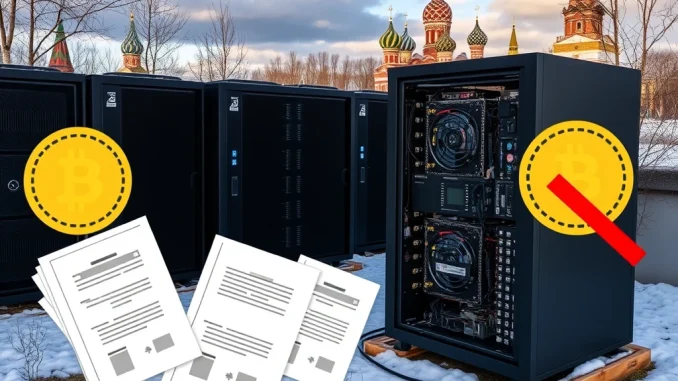
The world of cryptocurrency mining is constantly evolving, and navigating the regulatory landscape is a critical challenge for participants everywhere. In Russia, despite recent efforts to bring the industry into the legal fold, a significant majority of Russian crypto miners are reportedly operating outside the official framework. This situation presents a compelling look at the complexities of regulating a decentralized activity.
Understanding the New Crypto Mining Laws Russia Introduced
In late 2024, Russia took steps to address the growing cryptocurrency mining sector by implementing new legislation. These crypto mining laws Russia introduced aimed to establish clear legal definitions for mining activities and, importantly, introduce requirements for miners to register their operations with the government. The stated goal was to integrate the industry into the legal and economic system, potentially enabling taxation and better oversight of energy consumption, a significant concern given the power-intensive nature of mining.
Key aspects of the new legal framework included:
- Defining crypto mining as a legal activity.
- Establishing requirements for miners to register their activities.
- Potentially setting frameworks for energy consumption limits or tariffs.
- Aiming to prevent illicit activities associated with unregulated mining.
These laws represented a move towards formal recognition, a development many in the industry had anticipated. However, the path from legislation to widespread compliance appears to be fraught with difficulty.
Why Are Unregistered Miners Russia’s Biggest Regulatory Hurdle?
According to Ivan Chebeskov, a Finance Ministry official, a staggering 70% of unregistered miners Russia-wide continue to operate outside the new legal requirements. This high percentage indicates significant challenges in enforcing the new laws and encouraging compliance. Several factors likely contribute to this widespread lack of registration:
- Complexity and Bureaucracy: Navigating new government registration processes can be complex and time-consuming, particularly for individuals or small operations.
- Cost and Taxation: Registration often comes with the implication of future taxation on mining profits and potentially higher electricity tariffs, reducing profitability.
- Desire for Anonymity: Some miners prefer to operate anonymously, and registration directly conflicts with this desire.
- Lack of Awareness or Understanding: Despite the laws being passed, not all miners may be fully aware of the requirements or understand how to comply.
- Enforcement Challenges: Identifying and enforcing regulations on decentralized, often hidden, mining operations is inherently difficult for authorities.
This large segment of unregistered miners Russia represents a significant challenge to the government’s goals of legalizing and controlling the industry.
The View from the Finance Ministry Russia
The statement from the Finance Ministry Russia official, Ivan Chebeskov, underscores the government’s awareness of the low registration rate. While acknowledging that bringing the industry into the legal framework is an ongoing process, his comments, as reported via TASS and Cointelegraph, confirm that compliance is far from universal. This perspective from the Finance Ministry Russia highlights the gap between regulatory intent and the reality on the ground.
The government’s motivation for regulation includes:
- Gaining tax revenue from profitable mining operations.
- Managing the significant energy demands of large-scale mining farms, which can strain local power grids.
- Increasing transparency in the crypto sector to mitigate risks associated with illicit finance.
The current low registration rate suggests that these objectives are not being met effectively yet.
The Broader Impact on Russia Crypto Regulation
The high number of unregistered Russian crypto miners complicates the overall landscape of Russia crypto regulation. While the country has made strides in defining and partially legalizing crypto activities, the lack of compliance in a major sector like mining creates inconsistencies and undermines regulatory authority. The success of Russia crypto regulation hinges significantly on the ability to bring participants into the formal system.
Challenges posed by widespread non-compliance include:
- Difficulty in accurately assessing the size and economic contribution of the mining industry.
- Continued strain on energy infrastructure from unregulated operations.
- Potential for illicit activities to hide within the unregistered sector.
- Reduced potential tax revenue.
The government faces the task of finding effective ways to incentivize or enforce registration among the large population of miners currently operating outside the law.
What’s Next for Russian Crypto Miners and Regulators?
The situation with 70% of Russian crypto miners remaining unregistered suggests that the initial implementation of the new laws has not achieved immediate, widespread compliance. The government may need to consider alternative approaches, potentially including:
- Simplifying the registration process.
- Offering incentives for early registration.
- Increasing enforcement efforts against large, easily identifiable unregistered operations.
- Engaging with the mining community to understand and address their concerns.
The outcome of this ongoing process will significantly shape the future of the crypto mining industry in Russia and serve as a case study for other nations grappling with similar regulatory challenges.
Summary: A Long Road to Compliance
Despite the introduction of new crypto mining laws Russia implemented in late 2024, the vast majority, estimated at 70%, of Russian crypto miners remain unregistered. This reality, highlighted by the Finance Ministry Russia, underscores the significant hurdles in achieving compliance within the decentralized mining sector. The prevalence of unregistered miners Russia presents challenges for taxation, energy management, and overall regulatory oversight, complicating the broader landscape of Russia crypto regulation. Bringing these operations into the legal framework is an ongoing effort with no easy solutions, requiring potential adjustments in policy and enforcement to bridge the gap between legal definitions and practical reality.



